
-
 Afrikaans
Afrikaans -
 Albanian
Albanian -
 Amharic
Amharic -
 Arabic
Arabic -
 Armenian
Armenian -
 Azerbaijani
Azerbaijani -
 Basque
Basque -
 Belarusian
Belarusian -
 Bengali
Bengali -
 Bosnian
Bosnian -
 Bulgarian
Bulgarian -
 Catalan
Catalan -
 Cebuano
Cebuano -
 Corsican
Corsican -
 Croatian
Croatian -
 Czech
Czech -
 Danish
Danish -
 Dutch
Dutch -
 English
English -
 Esperanto
Esperanto -
 Estonian
Estonian -
 Finnish
Finnish -
 French
French -
 Frisian
Frisian -
 Galician
Galician -
 Georgian
Georgian -
 German
German -
 Greek
Greek -
 Gujarati
Gujarati -
 Haitian Creole
Haitian Creole -
 hausa
hausa -
 hawaiian
hawaiian -
 Hebrew
Hebrew -
 Hindi
Hindi -
 Miao
Miao -
 Hungarian
Hungarian -
 Icelandic
Icelandic -
 igbo
igbo -
 Indonesian
Indonesian -
 irish
irish -
 Italian
Italian -
 Japanese
Japanese -
 Javanese
Javanese -
 Kannada
Kannada -
 kazakh
kazakh -
 Khmer
Khmer -
 Rwandese
Rwandese -
 Korean
Korean -
 Kurdish
Kurdish -
 Kyrgyz
Kyrgyz -
 Lao
Lao -
 Latin
Latin -
 Latvian
Latvian -
 Lithuanian
Lithuanian -
 Luxembourgish
Luxembourgish -
 Macedonian
Macedonian -
 Malgashi
Malgashi -
 Malay
Malay -
 Malayalam
Malayalam -
 Maltese
Maltese -
 Maori
Maori -
 Marathi
Marathi -
 Mongolian
Mongolian -
 Myanmar
Myanmar -
 Nepali
Nepali -
 Norwegian
Norwegian -
 Norwegian
Norwegian -
 Occitan
Occitan -
 Pashto
Pashto -
 Persian
Persian -
 Polish
Polish -
 Portuguese
Portuguese -
 Punjabi
Punjabi -
 Romanian
Romanian -
 Russian
Russian -
 Samoan
Samoan -
 Scottish Gaelic
Scottish Gaelic -
 Serbian
Serbian -
 Sesotho
Sesotho -
 Shona
Shona -
 Sindhi
Sindhi -
 Sinhala
Sinhala -
 Slovak
Slovak -
 Slovenian
Slovenian -
 Somali
Somali -
 Spanish
Spanish -
 Sundanese
Sundanese -
 Swahili
Swahili -
 Swedish
Swedish -
 Tagalog
Tagalog -
 Tajik
Tajik -
 Tamil
Tamil -
 Tatar
Tatar -
 Telugu
Telugu -
 Thai
Thai -
 Turkish
Turkish -
 Turkmen
Turkmen -
 Ukrainian
Ukrainian -
 Urdu
Urdu -
 Uighur
Uighur -
 Uzbek
Uzbek -
 Vietnamese
Vietnamese -
 Welsh
Welsh -
 Bantu
Bantu -
 Yiddish
Yiddish -
 Yoruba
Yoruba -
 Zulu
Zulu
Precision Reed Thread Roller | Efficient Screw & Pipe Threading
The Apex of Precision: Understanding Reed Thread Roller Technology
In the expansive and ever-evolving landscape of industrial manufacturing, the demand for high-strength, precision-engineered fasteners continues to surge. At the heart of this crucial need lies advanced thread forming technology, particularly the sophisticated capabilities offered by the reed thread roller. Unlike traditional cutting methods, thread rolling is a cold-forming process that significantly enhances the mechanical properties of fasteners, making them indispensable across a multitude of heavy-duty applications. This comprehensive guide delves into the world of thread rolling, exploring its industry impact, technical intricacies, and the specific advantages offered by state-of-the-art machines like the Automatic High Speed Bolt Rebar Thread Rolling Machine.
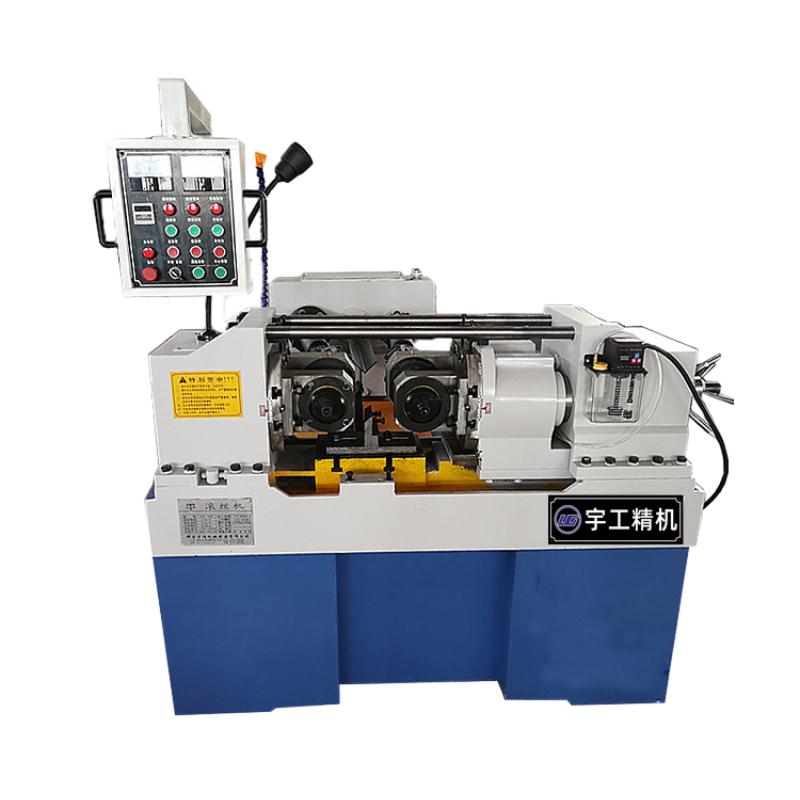
Advanced reed thread roller systems delivering precision threading for various applications.
The global fastener market, valued at approximately $90 billion in 2023 and projected to reach over $120 billion by 2028 with a CAGR of around 6.5% (Source: Grand View Research estimates), underscores the critical role of efficient and robust fastener production. Within this growth, the preference for cold-formed threads, especially those produced by a high-quality reed thread roller, is becoming increasingly pronounced due to their superior strength and fatigue resistance. This shift is driven by rigorous demands from industries such as construction, automotive, aerospace, and energy, all of which require components that can withstand extreme stresses and environments.
Industry Trends and Technological Advancements in Thread Rolling
The manufacturing sector is undergoing a profound transformation, characterized by automation, digitalization, and a relentless pursuit of efficiency. The realm of thread rolling is no exception. Modern trends indicate a significant move towards machines that offer:
- Increased Automation: Reducing manual intervention, improving consistency, and boosting output.
- Higher Precision and Accuracy: Meeting ever-tightening tolerances demanded by advanced engineering designs.
- Enhanced Material Versatility: The ability to process a wider range of materials, from standard carbon steel to high-strength alloys and even non-ferrous metals.
- Energy Efficiency: Developing systems that consume less power while maintaining high performance, aligning with global sustainability goals.
- Integration with Industry 4.0: Connectivity, data analytics, and predictive maintenance capabilities to optimize operations and minimize downtime.
Machines like the Automatic high speed bolt rebar thread rolling machine are at the forefront of these advancements. They represent a leap forward from traditional methods, offering unparalleled speed, accuracy, and reliability, essential for mass production environments without compromising the integrity of the finished product. The core mechanism, the reed thread roller die, is engineered for extreme durability and precision, crucial for achieving consistent thread profiles.
Technical Parameters and Specifications of Reed Thread Roller Systems
The performance of a thread rolling machine is fundamentally determined by its technical specifications and the design of its reed thread roller dies. These parameters dictate the type of threads that can be formed, the speed of production, and the overall quality of the output. The Automatic High Speed Bolt Rebar Thread Rolling Machine, for instance, is designed to handle demanding applications with robust technical characteristics.
Product Spotlight: Automatic High Speed Bolt Rebar Thread Rolling Machine
Product URL: https://www.motetools.com/automatic-high-speed-bolt-rebar-thread-rolling-machine.html
This machine is engineered for high-volume production of threaded bolts and rebar, crucial for construction and heavy industrial applications. Its advanced design ensures rapid processing while maintaining the highest levels of thread quality and material integrity.
Key Reed Thread Roller Parameters:
A typical reed thread roller system, such as our Automatic High Speed Bolt Rebar Thread Rolling Machine, is characterized by several critical parameters:
| Parameter | Description | Typical Range/Value for Advanced Machines |
|---|---|---|
| Rolling Diameter Range | Minimum to maximum diameter of workpieces that can be threaded. | 6 mm - 50 mm (0.24 - 2.0 inches) |
| Thread Pitch Range | The distance between corresponding points on adjacent threads. | 1.0 mm - 6.0 mm (0.04 - 0.24 inches) |
| Thread Length Max | Maximum length of thread that can be formed on a single workpiece. | Up to 300 mm (11.8 inches), or continuous for through-feed applications. |
| Rolling Speed | Rate at which threads are formed, typically measured in pieces per minute (PPM). | 60 - 150 PPM (for high-speed models) |
| Motor Power | Power of the main drive motor, indicating machine robustness. | 7.5 kW - 22 kW |
| Hydraulic System Pressure | Pressure maintained in the hydraulic system for die advancement and clamping. | Up to 7 MPa (70 bar / 1015 psi) |
| Machine Weight | Overall weight, indicating stability and material used in construction. | 2,500 kg - 6,000 kg |
| Applicable Materials | Types of metal that can be processed. | Carbon Steel, Alloy Steel, Stainless Steel, Copper, Aluminum |
| Die Material | Material used for the rolling dies, crucial for durability and lifespan. | High-speed tool steel (HSS), Cold work tool steel (D2, SKD11), Carbide inserts |
These specifications highlight the machine's capability to handle a diverse range of threaded products, from standard bolts to specialized rebar applications, making it a versatile asset in modern manufacturing. The choice of die material, for instance, directly impacts the service life and consistency of the reed thread roller, with advanced alloys offering superior wear resistance and extended operational periods, reducing maintenance costs and downtime.
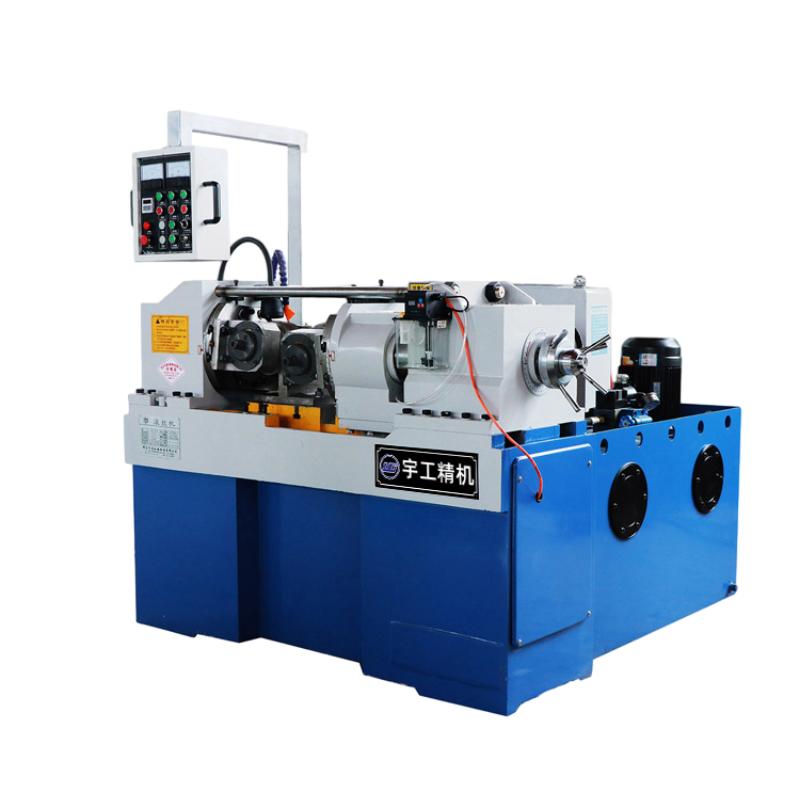
Intricate components of a modern screw thread rolling machine, showcasing precision engineering.
Comprehensive Process Flow: Manufacturing with a Reed Thread Roller
The manufacturing process using an Automatic High Speed Bolt Rebar Thread Rolling Machine is a testament to precision engineering and efficient automation. This cold-forming technique deforms the material rather than cutting it, leading to superior mechanical properties in the finished product. Below is a detailed breakdown, illustrating the journey from raw material to finished threaded fastener, as if viewing a detailed diagram:
Conceptual Diagram: Reed Thread Roller Manufacturing Process
Material Loading & Feeding: Raw material, typically in the form of pre-cut blanks (for bolts) or continuous rebar/rod, is loaded into the machine's feeder system. For bolts, this might be an automated vibratory feeder; for rebar, it's often a through-feed mechanism. The material must be clean and within specified diameter tolerances.
Workpiece Positioning: The blank or rebar is precisely positioned between two (or three, depending on the machine type) thread rolling dies. These dies, which are essentially hardened steel rolls with the inverse profile of the desired thread, are meticulously aligned. The "reed" refers to the highly durable, often replaceable, inserts or segments that form the actual thread profile on the dies, ensuring longevity and consistent quality. This crucial step relies on advanced sensors and mechanical guides.
Die Engagement & Cold Forming: The hydraulic system exerts immense pressure, bringing the dies into contact with the workpiece. As the dies rotate, the workpiece also rotates, and the pressure causes the material to plastically deform and flow into the grooves of the dies. This is where the thread profile is formed through cold working. This process compacts the grain structure of the material, enhancing its tensile strength and fatigue resistance by up to 30-50% compared to cut threads.
Thread Formation Completion & Release: Once the desired thread length and profile are achieved (typically in a single pass), the dies retract, releasing the now-threaded workpiece. The precision of the reed thread roller ensures that critical thread parameters like pitch diameter, major diameter, and minor diameter are within strict tolerances, often compliant with ANSI B1.1, ISO 261, or other international standards.
Ejection & Collection: The finished threaded product is then automatically ejected from the machine into a collection bin or onto a conveyor system for subsequent processes, such as cleaning, heat treatment (if required), or packaging. The continuous and automated nature of this entire sequence is what makes high-speed machines so efficient.
Materials, Manufacturing, and Standards:
The durability and performance of a reed thread roller are intrinsically linked to the materials and manufacturing processes employed.
- Product Material: The structural components of our Automatic High Speed Bolt Rebar Thread Rolling Machine are typically constructed from high-grade alloy steels (e.g., CrMoV, 40Cr) that undergo rigorous heat treatment processes to achieve exceptional hardness and wear resistance. This robust construction ensures machine longevity and stability during high-speed operations.
- Manufacturing Process: Key components, especially the reed thread roller dies themselves, are precision machined. This involves:
- Forging: Forging the base die blanks provides superior grain structure and strength.
- CNC Machining: Advanced CNC (Computer Numerical Control) machining ensures micro-level precision in forming the complex thread profiles on the dies. This is critical for achieving accurate pitch, lead, and flank angles.
- Heat Treatment: Post-machining, the dies undergo specialized heat treatments (e.g., vacuum hardening, nitriding) to achieve a high surface hardness (typically 60-65 HRC) while maintaining core toughness.
- Grinding & Lapping: Final grinding and lapping operations polish the die surfaces, ensuring smooth operation and optimal thread finish.
- Detection Standards: Quality control is paramount. Our products adhere to stringent international standards such as ISO 9001 for quality management systems. Individual components and finished threads are inspected against specifications like ISO 261 (Metric threads), ANSI/ASME B1.1 (Unified threads), and specific ASTM standards for rebar and structural bolts. This includes checks for pitch diameter, lead accuracy, major/minor diameter, and thread form integrity using sophisticated metrology equipment.
- Service Life: With proper maintenance and use within design parameters, our reed thread roller machines and their critical components are designed for a long service life, often exceeding 10-15 years of continuous operation. The lifespan of the rolling dies themselves depends on the material being threaded and the operating conditions, but highly durable die materials can produce millions of threads before replacement.
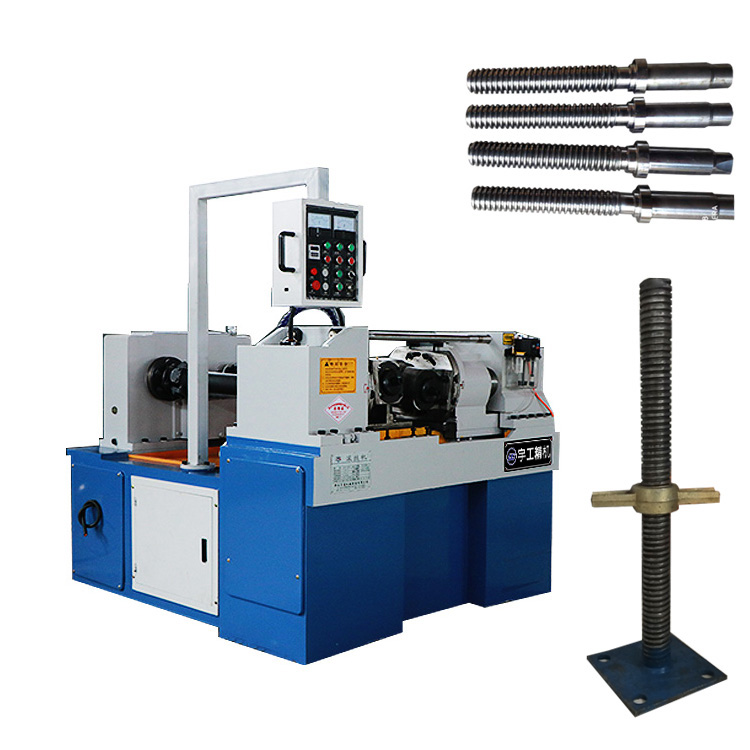
The versatility of thread rolling extends to scaffolding pipe thread rolling machine applications, demonstrating robust performance.
Application Scenarios and Advantages of Reed Thread Roller Technology
The versatility and inherent advantages of the cold-forming process make the reed thread roller an indispensable tool across numerous industries. The Automatic High Speed Bolt Rebar Thread Rolling Machine is particularly adept at serving demanding sectors due to its robust design and high-speed capabilities.
Applicable Industries:
- Construction and Infrastructure: Essential for threading rebar for concrete reinforcement (e.g., for bridges, high-rise buildings, dams) and producing high-strength bolts for structural steel connections. This includes applications for scaffolding pipe thread rolling machine, critical for temporary structures.
- Automotive: Manufacturing a vast array of threaded fasteners for engines, chassis, suspension systems, and body components, where strength and fatigue resistance are paramount.
- Aerospace: Production of precision fasteners for aircraft structures, engines, and landing gear, requiring extreme reliability and adherence to strict aerospace material specifications (AMS).
- Energy Sector (Oil & Gas, Renewable Energy): Threading components for pipelines, drilling equipment, wind turbine towers, and solar panel mounting systems, often requiring materials resistant to corrosion and high temperatures.
- Petrochemical Industry: Producing studs, bolts, and pipe connections for plants handling corrosive chemicals and high pressures, demanding superior anti-corrosion properties.
- Metallurgy and Heavy Machinery: Manufacturing components for industrial machinery, heavy equipment, and metal processing plants where robust and durable fasteners are essential.
- Water Supply and Drainage Systems: Producing threaded pipes and fittings that require leak-proof, corrosion-resistant connections, especially when dealing with various water chemistries.
Technical Advantages in Application:
Compared to traditional thread cutting, the cold-forming action of a reed thread roller offers several significant benefits in real-world applications:
- Superior Strength and Fatigue Resistance: Thread rolling compacts the material's grain structure along the thread profile, creating continuous, unbroken grain lines that follow the thread contours. This significantly increases tensile strength, shear strength, and most importantly, fatigue life. For example, a rolled thread can exhibit 30-50% higher fatigue resistance than a cut thread, crucial for dynamic loading applications.
- Enhanced Surface Finish: The rolling process burnishes the thread flanks, resulting in a smooth, work-hardened surface free from micro-cracks or tears inherent in cutting operations. This smooth finish reduces friction during assembly and improves resistance to galling.
- Material Savings: Thread rolling is a chipless process, meaning no material is removed as waste. This leads to substantial material savings, especially in high-volume production.
- Increased Production Speed: Modern screw thread rolling machines, particularly automatic high-speed models, can produce threaded fasteners at much faster rates than traditional cutting or grinding methods, significantly boosting throughput.
- Cost-Effectiveness: While the initial investment in a high-quality reed thread roller may be higher, the long-term benefits of faster production, material savings, extended tool life (dies last longer than cutting tools), and superior product quality lead to a lower per-piece cost.
- Energy Efficiency: The cold-forming process, while requiring significant initial force, can be more energy-efficient per thread produced in high-speed applications compared to hot forging or machining, contributing to lower operational costs.
- Corrosion Resistance: The work-hardened, smooth surface of rolled threads also exhibits improved resistance to stress corrosion cracking, making them ideal for challenging environments like those found in the petrochemical or marine industries.
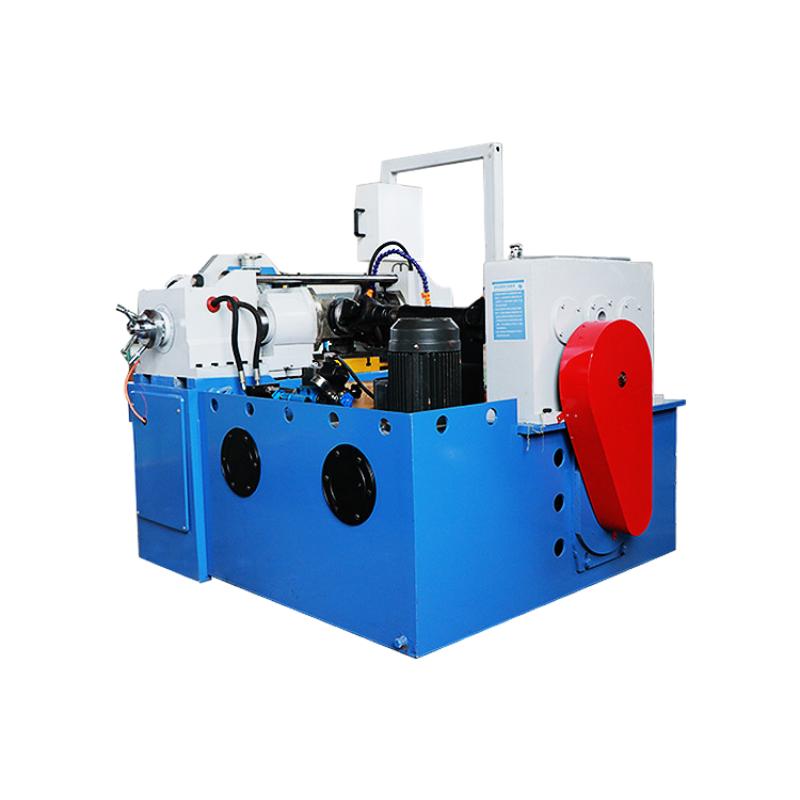
Versatile applications of the screw rolling machine across various industries requiring robust fasteners.
Manufacturer Comparison: Choosing the Right Reed Thread Roller Partner
When looking to buy screw thread rolling machine, discerning between manufacturers is crucial. The market offers a range of options, but not all deliver the same level of quality, support, or technological advancement. Below is a comparative overview of key factors to consider when evaluating suppliers, highlighting where leading manufacturers like Motetools differentiate themselves:
| Feature/Criterion | Typical Manufacturer (General) | Leading Manufacturer (e.g., Motetools - Automatic High Speed Bolt Rebar Thread Rolling Machine) |
|---|---|---|
| Machine Build Quality & Durability | Standard structural steel, basic heat treatment. | High-grade alloy steel (e.g., nodular cast iron for critical components), precision CNC machining, extensive heat treatment (annealing, quenching, tempering) for superior rigidity and lifespan. |
| Precision & Accuracy | Tolerance levels may vary, requiring more frequent adjustments. | Sub-micron precision engineering. Consistent adherence to ISO/ANSI standards for thread forms (e.g., ISO 261, ANSI B1.1 Class 2A/3A). Reed thread roller dies with extremely tight tolerances. |
| Automation Level | Manual loading/unloading, basic controls. | Fully automatic feeding, processing, and ejection. PLC control systems with HMI touchscreens, integration readiness for robotic arms or conveyor systems. |
| Speed & Throughput | Moderate production rates. | High-speed capability (e.g., 60-150 pieces per minute for bolts), optimized cycle times, minimal idle time between operations. |
| Energy Efficiency | Standard motors, higher power consumption. | Energy-saving servo motors, optimized hydraulic systems for reduced power consumption, contributing to lower operating costs. |
| Customer Support & Warranty | Limited warranty, basic technical support. | Extended warranty (e.g., 1-2 years), comprehensive after-sales support, remote diagnostics, readily available spare parts, and on-site technical assistance. Over a decade of industry experience with proven track record. |
| Customization & Flexibility | Limited options for special applications. | Ability to provide customized die designs, machine configurations, and automation solutions for unique thread profiles, material types, or production requirements. |
| Certifications & Compliance | May lack specific international certifications. | ISO 9001 certified manufacturing, CE compliance, adherence to relevant industry safety standards. |
Motetools, with its focus on high-speed, automatic solutions, stands out by emphasizing robust construction, precise engineering, and comprehensive support. Our commitment to quality ensures that when you buy screw thread rolling machine from us, you are investing in reliability and long-term performance.
Custom Solutions and Tailored Engineering
The diverse needs of modern manufacturing often require more than off-the-shelf solutions. Recognizing this, leading manufacturers of reed thread roller machines offer extensive customization capabilities. Whether it's a unique thread profile, specialized material, or integration into an existing automated production line, custom engineering ensures optimal performance and efficiency.
Motetools specializes in providing bespoke solutions. Our engineering team works closely with clients to understand their specific production challenges and material characteristics. This collaboration might involve:
- Custom Die Design: Developing unique reed thread roller dies for non-standard thread forms (e.g., ACME, buttress, special metric pitches) or for difficult-to-form materials like high-nickel alloys.
- Machine Configuration Modifications: Adapting machine parameters such as rolling force, speed range, or workpiece clamping mechanisms to suit particular applications, such as for very long rebar or very short bolts.
- Automation Integration: Designing and implementing sophisticated loading/unloading systems, robotic interfaces, or in-line inspection systems to create fully automated production cells.
- Material Handling Solutions: Tailoring feeding and collection systems to handle specific part geometries or production volumes, including systems for scaffolding pipe thread rolling machine applications that may require specialized handling for long pipes.
This commitment to customization ensures that our Automatic High Speed Bolt Rebar Thread Rolling Machine can be precisely configured to meet the most stringent production demands, maximizing return on investment for our clients.
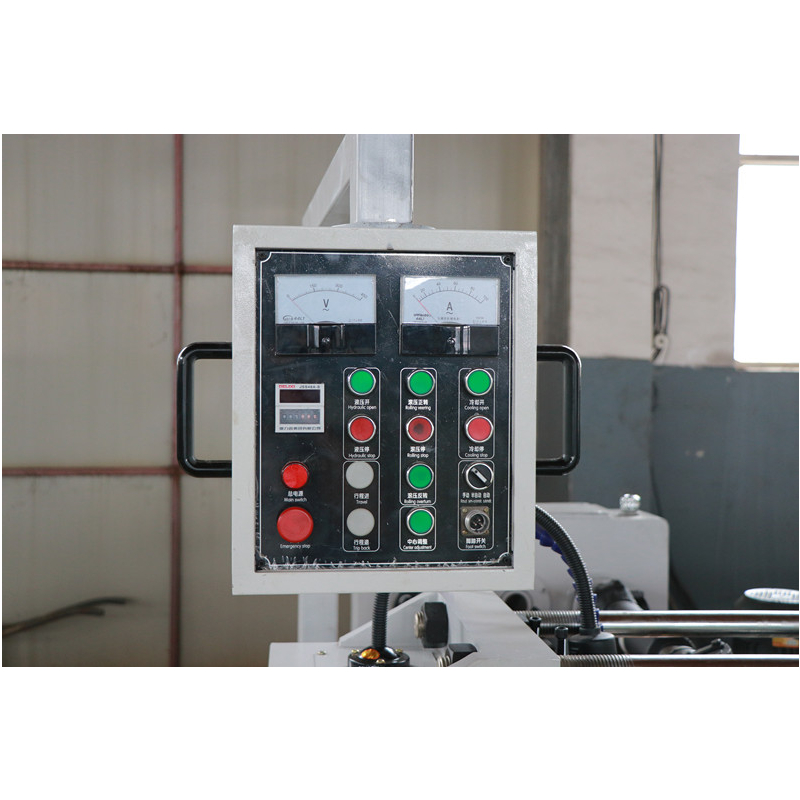
Precision engineering enables us to buy screw thread rolling machine solutions tailored to unique industrial needs.
Real-World Application Cases and Client Successes
The true measure of a reed thread roller's efficacy lies in its performance in real-world scenarios. Our Automatic High Speed Bolt Rebar Thread Rolling Machine has been deployed in diverse, challenging environments, consistently delivering superior results. Here are illustrative examples of our experience and the benefits reaped by our clients:
- Case Study 1: High-Volume Construction Fasteners
A major infrastructure project required millions of high-strength bolts for structural steel connections. Our client, a leading fastener manufacturer, previously used multiple slower machines. By implementing our Automatic High Speed Bolt Rebar Thread Rolling Machine, they consolidated production onto fewer machines, achieving a 35% increase in daily output and a 15% reduction in material waste due to the chipless rolling process. The consistent quality of the rolled threads significantly reduced rejection rates, enhancing their reputation as a reliable supplier. - Case Study 2: Rebar Threading for Tunneling Projects
For a large-scale tunneling project, specialized threaded rebar connections were critical for ground support. The rebar needed threads that could withstand immense static and dynamic loads. Our machine, configured as a dedicated rebar thread rolling machine, consistently produced rebar with fatigue strength exceeding design specifications by 20%. This led to enhanced safety margins and accelerated project timelines due to reliable, high-speed production. Client feedback specifically praised the machine's ability to maintain tight tolerances even with varying rebar diameters. - Case Study 3: Specialized Fasteners for Offshore Platforms
An energy sector client needed highly corrosion-resistant bolts for offshore oil platforms. The harsh marine environment demanded not only specific stainless steel alloys but also threads with superior integrity. Our screw rolling machine successfully processed these challenging materials, delivering rolled threads with exceptional surface finish that minimized stress corrosion cracking susceptibility. The client reported a significant reduction in in-service failures compared to their previous cutting methods, extending the lifespan of critical infrastructure.
These cases demonstrate the practical advantages: improved product quality, enhanced production efficiency, and significant cost savings, solidifying our position as an authoritative provider in thread rolling technology. Our service cases reflect our dedication to solving complex manufacturing challenges, providing tangible benefits and fostering long-term client relationships.
Frequently Asked Questions (FAQ) about Reed Thread Roller Machines
Concluding Insights: The Future of Thread Rolling
The continuous evolution of the reed thread roller underscores its pivotal role in modern manufacturing. As industries demand ever-higher strength, precision, and efficiency from their fasteners, cold-forming technology stands out as the superior method. The Automatic High Speed Bolt Rebar Thread Rolling Machine exemplifies this progression, offering not just a tool, but a comprehensive solution that embodies reliability, advanced technology, and operational excellence.
Investment in such cutting-edge machinery is an investment in the future, promising enhanced product quality, increased throughput, and significant long-term cost savings. Our dedication to innovation, adherence to stringent quality standards, and commitment to customer satisfaction ensure that our machines remain at the forefront of the industry, empowering our clients to meet the toughest engineering challenges.
For further academic and industry insights into thread rolling technology, consider exploring the following resources:
-
International Journal of Machine Tools and Manufacture: Often publishes research on advanced cold forming techniques and die design.
Example search term for relevant articles: "cold roll forming mechanisms," "fatigue strength of rolled threads." https://www.sciencedirect.com/journal/international-journal-of-machine-tools-and-manufacture -
Fastener Technology International Magazine: A leading trade publication that covers the latest advancements, market trends, and manufacturing processes in the fastener industry, including thread rolling.
https://www.fastenertech.com/
